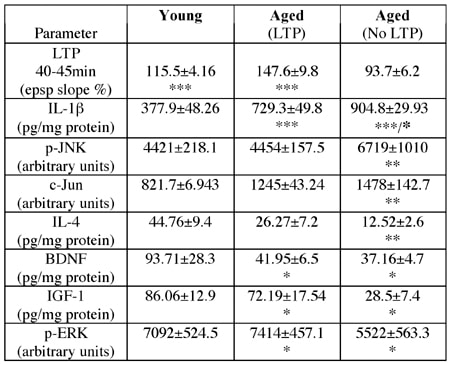Hippocampal-dependent cognitive function has been shown to decline with age and this is paralleled by an age-related decrease in long-term potentiation (LTP). Upregulation of pro-inflammatory signalling pathways is believed to contribute to this decline. We tested this hypothesis by analysing interleukin-1β-induced signalling events in aged animals which did and did not sustain LTP in perforant path granule cell synapses.
Aged (22-24 months; n = 14) and young (2-3 months; n = 6) male Wistar rats were anaesthetized by intraperitoneal injection of urethane (1.5 g kg-1) and assessed for their ability to sustain LTP following perforant path stimulation (3 trains of stimuli; 250 Hz for 200 msec; 30sec interval). The animals were killed 45 min after tetanic stimulation by decapitation and the hippocampus removed and stored for later analysis of IL-1β, interleukin-4 (IL-4), brain-derived neurotrophic factor (BDNF) and insulin-like growth factor-1 (IGF-1) by ELISA, and phosphorylation of c-Jun N-terminal kinase (JNK), extracellular signal regulated kinase (ERK) and c-Jun by gel-electrophoresis and Western immunoblotting.
Statistical analysis was carried out by one-way ANOVA in conjunction with a post hoc Student-Newmann-Keuls test. Data are shown as means ± S.E.M. and considered significant when P < 0.05 (*P < 0.05; **P < 0.01; ***P < 0.001).
LTP was sustained in all young rats; seven aged rats sustained LTP and seven did not. Percentage changes in EPSP slope in the last 5 min of the experiment are shown in the table. We show evidence that age-related impairment in LTP is associated with an upregulation in IL-1β concentration and the activity of its downstream signalling components, JNK and c-Jun, as previously shown (Vereker et al. 2000). These changes were not seen in aged animals that sustained LTP. The age-related impairment in LTP was also associated with a significant decline in the concentration of BDNF, IL-4 and IGF-1 concentrations and activation of ERK. Thus, attenuation of survival signaling is also likely to contribute to the observed age-related impairment of LTP.

